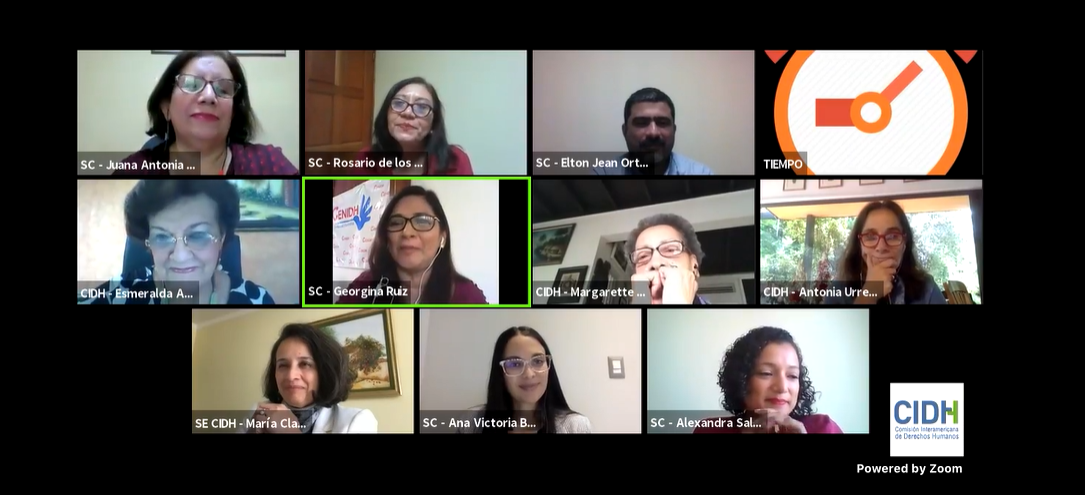IACHR Thematic Hearing: Nicaraguan Civil Society Exposes the Situation of 110 Political Prisoners
Washington, D.C.; December 10, 2020. At a hearing held today during the 178th Period of Sessions of the Inter-American Commission on Human Rights (IACHR), Nicaraguan human rights defenders presented evidence of serious rights violations against 110 people who are imprisoned for political reasons. Ana Bolaños, Legal Program Officer at Race and Equality; Juanita Jiménez of […]

Washington, D.C.; December 10, 2020. At a hearing held today during the 178th Period of Sessions of the Inter-American Commission on Human Rights (IACHR), Nicaraguan human rights defenders presented evidence of serious rights violations against 110 people who are imprisoned for political reasons.
Ana Bolaños, Legal Program Officer at Race and Equality; Juanita Jiménez of the Autonomous Women’s Movement (MAM); Rosario Flores from the Meso-American Human Rights Defenders Initiative (IM-Defensoras) and Georgina Ruiz of the Nicaraguan Center for Human Rights (CENIDH) gave testimony during the hearing along with Elton Ortega and Alexandra Salazar from the Legal Defense Unit of Nicaragua (UDJ). These organizations collaborated to solicit a hearing on the topic of political prisoners.
The participants emphasized that of these 110 political prisoners, imprisoned for their roles in the protests of April 2018, 14 are held in maximum-security settings or isolation cells. Even those in less severe settings have reported deficient healthcare, insufficient food, and a lack of potable water in prison. They also suffer discriminatory treatment from prison officials, the denial of visits and phone calls, threats, beatings, and torture.
The participants laid out that the arrests and judicial processes against these victims have been marked by blatant violations of their rights and judicial guarantees. The Nicaraguan police, Public Ministry, judicial branch, and penitential system have coordinated to persecute the victims as part of the current government’s campaign to repress its political opponents.
The organizations also highlighted serious threats to individual liberties and to the Independence of the justice system posed by three recent laws: the Law on Foreign Agents, the Cybercrimes Law, and the constitutional reform establishing life in prison as a possible criminal sentence. These three efforts are all aimed at criminalizing civil society organizations, independent media, and other sources of opposition.
To address this deterioration of human rights, the participants asked the IACHR to call on the State of Nicaragua to release the prisoners immediately, end the ongoing arbitrary detentions and harassment of the prisoners’ family members, and investigate the reports of cruel, inhumane, and degrading treatment including torture.
They also called upon the State directly to release information about the status of the COVID-19 pandemic in prisons and efforts to attend to prisoners’ health. The participants insisted that Nicaragua allow the IACHR, the IACHR’s Special Monitoring Mechanism for Nicaragua (MESENI), and the Office of the UN High Commissioner for Human Rights to return to the country.
The IACHR’s reaction
Despite being invited to take part in the haring by the IACHR, the State of Nicaragua did not send a representative. Commissioner Stuardo Ralón lamented this absence and opined that it “indicates an attitude of total denial of international obligations,” noting that governments have a responsibility to respond to their citizens’ demands for truth and justice.
Commissioner Esmeralda Arosemena stated that the IACHR remains willing to work with the State, calling on Nicaragua to work with the Commission. Commissioner Arosemena reflected that the civil society representatives had, throughout their testimonies, described the State’s actions as “violent, perverse, repressive, cruel, inhumane, illegal, stigmatizing, criminalizing” and emphasized the need to find concrete solutions to improve the State’s conduct.
The IACHR Commissioners and Rapporteurs all stressed the value of Nicaraguan civil society’s contributions, highlighting the role of civil society in providing legal defense to political prisoners, accompanying their families, and documenting human rights violations.
“I want to urge all who can to continue this fight, and to recognize the valuable information that you’ve given us. We are determined to use all our tools to make the culture of human rights a reality in Nicaragua,” said Commissioner Ralón.
Commissioner Antonia Urrejola, First Vice-President of the IACHR and the rapporteur for Nicaragua, referenced a recent IACHR report concluding that 1,614 people had been arbitrarily deprived of liberty for taking part in the protest movement that began in April 2018. She also acknowledged that this figure is likely an under-counting and urged the petitioners to continue their work documenting violations.
Commissioner Urrejola also expression the Commission’s concern regarding the lack of due process in Nicaragua’s judicial system. “We are concerned at the lack of Independence among different branches, especially considering that the electoral process will take place next year. Institutions must be able to act independently of the executive to secure democratic spaces and protect the fundamental freedom of expression.”

